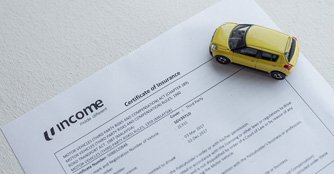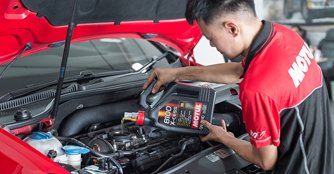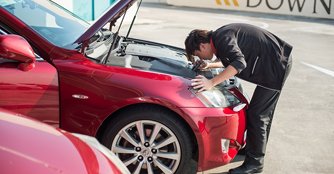Six crucial components to consider before buying a used car
20 Apr 2018|53,614 views
Many people living in Singapore choose to purchase used cars for an obvious reason - they require less financial commitment than new ones.
As many of us know, owning a car in Singapore, even if it is a base model, is quite expensive. Once you decide to purchase your own car, you are also stepping into a recurring financial responsibility to spend on maintenance, insurance, and monthly instalments.
If you're on a tight budget, enjoying the convenience of having your own car should not take priority over basic necessities such as having a roof over your head or being able to feed yourself.
While many used cars can run for years without a hitch, many more are priced so low that those dirt cheap deals may sound way too good to be true.
In order to protect yourself (and your wallet) and to help you make an informed decision, we've compiled six crucial components of the used car buying process you must consider before purchasing your next ride.

 There are several factors that affect the cost of premiums, get a quote if you are looking to renew your car insurance
There are several factors that affect the cost of premiums, get a quote if you are looking to renew your car insurance
1. Insurance
The law in Singapore requires car owners to purchase motor insurance for their vehicles, and this is a big help in case of vehicle damage or injuries to pedestrians, passengers, and other drivers.
The amount you need to pay for your motor insurance premium will depend on several factors such as your age, gender, qualification for a No-Claim Discount, years of driving experience, and occupation.
Insurance companies calculate premiums based on these factors that they consider to be pertinent to the likelihood of a customer filing an insurance claim in the future.
Since there are many insurance providers in Singapore, take the time to compare car insurance schemes before making your decision. You should also familiarise yourself with the various car insurance terms.
2. Full cash or loan?
Unless you have saved up enough money to pay for the car in cash up front, you will probably have to refinance the remaining amount of its selling price once you've made your downpayment. Most dealers offer in-house refinance services while banks offer auto loans.
If, for some reason, you aren't able to fork out the cash for your downpayment, you do have the option of taking a personal loan from your preferred bank. However, we strongly suggest you do not do this as you'll be killing yourself in the long run.
3. Road tax
Depending on your vehicle type and its engine capacity, you will have to pay around $740 (for 1.6-litre cars) a year or more for road tax. This may not sound like much, but it translates to more than $2 per day, regardless of your vehicle usage.
4. Maintenance and running costs
The value of your vehicle can be reduced dramatically if it is not properly maintained. In addition to paying for your road tax, monthly instalments and annual insurance premiums, you will need to spend on your vehicle's maintenance and parking.
As many of us know, owning a car in Singapore, even if it is a base model, is quite expensive. Once you decide to purchase your own car, you are also stepping into a recurring financial responsibility to spend on maintenance, insurance, and monthly instalments.
If you're on a tight budget, enjoying the convenience of having your own car should not take priority over basic necessities such as having a roof over your head or being able to feed yourself.
While many used cars can run for years without a hitch, many more are priced so low that those dirt cheap deals may sound way too good to be true.
In order to protect yourself (and your wallet) and to help you make an informed decision, we've compiled six crucial components of the used car buying process you must consider before purchasing your next ride.

1. Insurance
The law in Singapore requires car owners to purchase motor insurance for their vehicles, and this is a big help in case of vehicle damage or injuries to pedestrians, passengers, and other drivers.
The amount you need to pay for your motor insurance premium will depend on several factors such as your age, gender, qualification for a No-Claim Discount, years of driving experience, and occupation.
Insurance companies calculate premiums based on these factors that they consider to be pertinent to the likelihood of a customer filing an insurance claim in the future.
Since there are many insurance providers in Singapore, take the time to compare car insurance schemes before making your decision. You should also familiarise yourself with the various car insurance terms.
2. Full cash or loan?
Unless you have saved up enough money to pay for the car in cash up front, you will probably have to refinance the remaining amount of its selling price once you've made your downpayment. Most dealers offer in-house refinance services while banks offer auto loans.
If, for some reason, you aren't able to fork out the cash for your downpayment, you do have the option of taking a personal loan from your preferred bank. However, we strongly suggest you do not do this as you'll be killing yourself in the long run.
3. Road tax
Depending on your vehicle type and its engine capacity, you will have to pay around $740 (for 1.6-litre cars) a year or more for road tax. This may not sound like much, but it translates to more than $2 per day, regardless of your vehicle usage.
4. Maintenance and running costs
The value of your vehicle can be reduced dramatically if it is not properly maintained. In addition to paying for your road tax, monthly instalments and annual insurance premiums, you will need to spend on your vehicle's maintenance and parking.
Regular maintenance of your car is essential to keep it working as it should, and to avoid accidents that may be caused by driving an inadequately maintained vehicle.
Maintenance doesn't just consist of routine servicing, it also includes the replacement of wear and tear parts. These costs will differ depending on factors such as your car's age, mileage and engine capacity. Generally, the costs climb with the age of the vehicle.
5. PARF or COE?
This is a crucial question to ask yourself if you are considering buying a used car. More than the colour, make and model of the vehicle, you will have to decide between a Preferential Additional Registration Fee (PARF) and a Certificate of Entitlement (COE) car.
Here's a quick comparison between PARF and COE cars:

 A well-maintained vehicle will have significantly lower chances of breaking down, which will, in turn, reduce your repair costs
A well-maintained vehicle will have significantly lower chances of breaking down, which will, in turn, reduce your repair costs
Buying a PARF car is usually more costly because it requires a bigger upfront payment than a COE car. However, PARF cars are typically newer and come with less mileage than COE cars. This means that you tend to save on road tax and maintenance costs. But if you are only looking to have a cheap vehicle to drive until you can afford to upgrade to a new car, then your best bet is to get a COE car.
6. How 'used' is the car?
Checking the vehicle for any corrosion or leaks, its general cleanliness, and even looking out for any residual smells are several ways to get a feel for the condition of the car you are thinking of buying.

 Don't focus only on the outlook of the car, look under the hood, too, for oil leaks or signs of an accident
Don't focus only on the outlook of the car, look under the hood, too, for oil leaks or signs of an accident
Mileage plays a huge role in determining the value of a used car. Generally, the lower the mileage, the more expensive the car. It is worth noting that although a vehicle's mileage is not always indicative of its condition, if the car you're interested in has already clocked hundreds of thousands of kilometres, you might want to reconsider buying it.
This is due to the fact that more mileage opens the vehicle up to more wear and tear, and possibly more expensive repair costs down the line. A general rule of thumb is to look for a car that has clocked an average annual mileage of between 5,000km and 18,000km.
You should also find out how many owners the car has had before you came along. Too many previous owners may indicate problems that you might not be aware of until it's too late.
When inspecting a car you're interested in buying, it's not essential but it would be good to have an extra pair of eyes and ears. Try to bring a friend along, preferably someone who knows cars. Or, if you're feeling kiasu, you can always send the car to a trusted workshop to have it checked out by a professional.
Here are some related articles that might interest you
Ultimate Guide to Car Insurance in Singapore
You need to avoid these 5 car buying mistakes at all costs
10 signs that a secondhand car has been in an accident before
Buying a used car: A guide to getting the best price
Buying used cars is the smarter choice in Singapore. Here's why


Maintenance doesn't just consist of routine servicing, it also includes the replacement of wear and tear parts. These costs will differ depending on factors such as your car's age, mileage and engine capacity. Generally, the costs climb with the age of the vehicle.
5. PARF or COE?
This is a crucial question to ask yourself if you are considering buying a used car. More than the colour, make and model of the vehicle, you will have to decide between a Preferential Additional Registration Fee (PARF) and a Certificate of Entitlement (COE) car.
Here's a quick comparison between PARF and COE cars:
- A PARF car is a vehicle that has been deregistered before or at the end of its first COE cycle, which means that it is eligible for a PARF rebate
- A COE car is one that has had its COE renewed by means of paying the Prevailing Quota Premium and will no longer be entitled to the PARF rebate once it is deregistered

Buying a PARF car is usually more costly because it requires a bigger upfront payment than a COE car. However, PARF cars are typically newer and come with less mileage than COE cars. This means that you tend to save on road tax and maintenance costs. But if you are only looking to have a cheap vehicle to drive until you can afford to upgrade to a new car, then your best bet is to get a COE car.
6. How 'used' is the car?
Checking the vehicle for any corrosion or leaks, its general cleanliness, and even looking out for any residual smells are several ways to get a feel for the condition of the car you are thinking of buying.

Mileage plays a huge role in determining the value of a used car. Generally, the lower the mileage, the more expensive the car. It is worth noting that although a vehicle's mileage is not always indicative of its condition, if the car you're interested in has already clocked hundreds of thousands of kilometres, you might want to reconsider buying it.
This is due to the fact that more mileage opens the vehicle up to more wear and tear, and possibly more expensive repair costs down the line. A general rule of thumb is to look for a car that has clocked an average annual mileage of between 5,000km and 18,000km.
You should also find out how many owners the car has had before you came along. Too many previous owners may indicate problems that you might not be aware of until it's too late.
When inspecting a car you're interested in buying, it's not essential but it would be good to have an extra pair of eyes and ears. Try to bring a friend along, preferably someone who knows cars. Or, if you're feeling kiasu, you can always send the car to a trusted workshop to have it checked out by a professional.
Here are some related articles that might interest you
Ultimate Guide to Car Insurance in Singapore
You need to avoid these 5 car buying mistakes at all costs
10 signs that a secondhand car has been in an accident before
Buying a used car: A guide to getting the best price
Buying used cars is the smarter choice in Singapore. Here's why

Sgcarmart
Get up to 20% off and $300 cashback when you renew with select car insurance!
Compare car insurance effortlessly with Sgcarmart. Get exclusive offers, discounts and cashback when renewing car insurance with our partner.
- Auto comparison for your future renewal quotes
- We provide claims support for your accident claims
Many people living in Singapore choose to purchase used cars for an obvious reason - they require less financial commitment than new ones.
As many of us know, owning a car in Singapore, even if it is a base model, is quite expensive. Once you decide to purchase your own car, you are also stepping into a recurring financial responsibility to spend on maintenance, insurance, and monthly instalments.
If you're on a tight budget, enjoying the convenience of having your own car should not take priority over basic necessities such as having a roof over your head or being able to feed yourself.
While many used cars can run for years without a hitch, many more are priced so low that those dirt cheap deals may sound way too good to be true.
In order to protect yourself (and your wallet) and to help you make an informed decision, we've compiled six crucial components of the used car buying process you must consider before purchasing your next ride.

 There are several factors that affect the cost of premiums, get a quote if you are looking to renew your car insurance
There are several factors that affect the cost of premiums, get a quote if you are looking to renew your car insurance
1. Insurance
The law in Singapore requires car owners to purchase motor insurance for their vehicles, and this is a big help in case of vehicle damage or injuries to pedestrians, passengers, and other drivers.
The amount you need to pay for your motor insurance premium will depend on several factors such as your age, gender, qualification for a No-Claim Discount, years of driving experience, and occupation.
Insurance companies calculate premiums based on these factors that they consider to be pertinent to the likelihood of a customer filing an insurance claim in the future.
Since there are many insurance providers in Singapore, take the time to compare car insurance schemes before making your decision. You should also familiarise yourself with the various car insurance terms.
2. Full cash or loan?
Unless you have saved up enough money to pay for the car in cash up front, you will probably have to refinance the remaining amount of its selling price once you've made your downpayment. Most dealers offer in-house refinance services while banks offer auto loans.
If, for some reason, you aren't able to fork out the cash for your downpayment, you do have the option of taking a personal loan from your preferred bank. However, we strongly suggest you do not do this as you'll be killing yourself in the long run.
3. Road tax
Depending on your vehicle type and its engine capacity, you will have to pay around $740 (for 1.6-litre cars) a year or more for road tax. This may not sound like much, but it translates to more than $2 per day, regardless of your vehicle usage.
4. Maintenance and running costs
The value of your vehicle can be reduced dramatically if it is not properly maintained. In addition to paying for your road tax, monthly instalments and annual insurance premiums, you will need to spend on your vehicle's maintenance and parking.
As many of us know, owning a car in Singapore, even if it is a base model, is quite expensive. Once you decide to purchase your own car, you are also stepping into a recurring financial responsibility to spend on maintenance, insurance, and monthly instalments.
If you're on a tight budget, enjoying the convenience of having your own car should not take priority over basic necessities such as having a roof over your head or being able to feed yourself.
While many used cars can run for years without a hitch, many more are priced so low that those dirt cheap deals may sound way too good to be true.
In order to protect yourself (and your wallet) and to help you make an informed decision, we've compiled six crucial components of the used car buying process you must consider before purchasing your next ride.

1. Insurance
The law in Singapore requires car owners to purchase motor insurance for their vehicles, and this is a big help in case of vehicle damage or injuries to pedestrians, passengers, and other drivers.
The amount you need to pay for your motor insurance premium will depend on several factors such as your age, gender, qualification for a No-Claim Discount, years of driving experience, and occupation.
Insurance companies calculate premiums based on these factors that they consider to be pertinent to the likelihood of a customer filing an insurance claim in the future.
Since there are many insurance providers in Singapore, take the time to compare car insurance schemes before making your decision. You should also familiarise yourself with the various car insurance terms.
2. Full cash or loan?
Unless you have saved up enough money to pay for the car in cash up front, you will probably have to refinance the remaining amount of its selling price once you've made your downpayment. Most dealers offer in-house refinance services while banks offer auto loans.
If, for some reason, you aren't able to fork out the cash for your downpayment, you do have the option of taking a personal loan from your preferred bank. However, we strongly suggest you do not do this as you'll be killing yourself in the long run.
3. Road tax
Depending on your vehicle type and its engine capacity, you will have to pay around $740 (for 1.6-litre cars) a year or more for road tax. This may not sound like much, but it translates to more than $2 per day, regardless of your vehicle usage.
4. Maintenance and running costs
The value of your vehicle can be reduced dramatically if it is not properly maintained. In addition to paying for your road tax, monthly instalments and annual insurance premiums, you will need to spend on your vehicle's maintenance and parking.
Regular maintenance of your car is essential to keep it working as it should, and to avoid accidents that may be caused by driving an inadequately maintained vehicle.
Maintenance doesn't just consist of routine servicing, it also includes the replacement of wear and tear parts. These costs will differ depending on factors such as your car's age, mileage and engine capacity. Generally, the costs climb with the age of the vehicle.
5. PARF or COE?
This is a crucial question to ask yourself if you are considering buying a used car. More than the colour, make and model of the vehicle, you will have to decide between a Preferential Additional Registration Fee (PARF) and a Certificate of Entitlement (COE) car.
Here's a quick comparison between PARF and COE cars:

 A well-maintained vehicle will have significantly lower chances of breaking down, which will, in turn, reduce your repair costsBuying a PARF car is usually more costly because it requires a bigger upfront payment than a COE car. However, PARF cars are typically newer and come with less mileage than COE cars. This means that you tend to save on road tax and maintenance costs. But if you are only looking to have a cheap vehicle to drive until you can afford to upgrade to a new car, then your best bet is to get a COE car.
A well-maintained vehicle will have significantly lower chances of breaking down, which will, in turn, reduce your repair costsBuying a PARF car is usually more costly because it requires a bigger upfront payment than a COE car. However, PARF cars are typically newer and come with less mileage than COE cars. This means that you tend to save on road tax and maintenance costs. But if you are only looking to have a cheap vehicle to drive until you can afford to upgrade to a new car, then your best bet is to get a COE car.
6. How 'used' is the car?
Checking the vehicle for any corrosion or leaks, its general cleanliness, and even looking out for any residual smells are several ways to get a feel for the condition of the car you are thinking of buying.

 Don't focus only on the outlook of the car, look under the hood, too, for oil leaks or signs of an accidentMileage plays a huge role in determining the value of a used car. Generally, the lower the mileage, the more expensive the car. It is worth noting that although a vehicle's mileage is not always indicative of its condition, if the car you're interested in has already clocked hundreds of thousands of kilometres, you might want to reconsider buying it.
Don't focus only on the outlook of the car, look under the hood, too, for oil leaks or signs of an accidentMileage plays a huge role in determining the value of a used car. Generally, the lower the mileage, the more expensive the car. It is worth noting that although a vehicle's mileage is not always indicative of its condition, if the car you're interested in has already clocked hundreds of thousands of kilometres, you might want to reconsider buying it.
This is due to the fact that more mileage opens the vehicle up to more wear and tear, and possibly more expensive repair costs down the line. A general rule of thumb is to look for a car that has clocked an average annual mileage of between 5,000km and 18,000km.
You should also find out how many owners the car has had before you came along. Too many previous owners may indicate problems that you might not be aware of until it's too late.
When inspecting a car you're interested in buying, it's not essential but it would be good to have an extra pair of eyes and ears. Try to bring a friend along, preferably someone who knows cars. Or, if you're feeling kiasu, you can always send the car to a trusted workshop to have it checked out by a professional.
Here are some related articles that might interest you
Ultimate Guide to Car Insurance in Singapore
You need to avoid these 5 car buying mistakes at all costs
10 signs that a secondhand car has been in an accident before
Buying a used car: A guide to getting the best price
Buying used cars is the smarter choice in Singapore. Here's why


Maintenance doesn't just consist of routine servicing, it also includes the replacement of wear and tear parts. These costs will differ depending on factors such as your car's age, mileage and engine capacity. Generally, the costs climb with the age of the vehicle.
5. PARF or COE?
This is a crucial question to ask yourself if you are considering buying a used car. More than the colour, make and model of the vehicle, you will have to decide between a Preferential Additional Registration Fee (PARF) and a Certificate of Entitlement (COE) car.
Here's a quick comparison between PARF and COE cars:
- A PARF car is a vehicle that has been deregistered before or at the end of its first COE cycle, which means that it is eligible for a PARF rebate
- A COE car is one that has had its COE renewed by means of paying the Prevailing Quota Premium and will no longer be entitled to the PARF rebate once it is deregistered

6. How 'used' is the car?
Checking the vehicle for any corrosion or leaks, its general cleanliness, and even looking out for any residual smells are several ways to get a feel for the condition of the car you are thinking of buying.

This is due to the fact that more mileage opens the vehicle up to more wear and tear, and possibly more expensive repair costs down the line. A general rule of thumb is to look for a car that has clocked an average annual mileage of between 5,000km and 18,000km.
You should also find out how many owners the car has had before you came along. Too many previous owners may indicate problems that you might not be aware of until it's too late.
When inspecting a car you're interested in buying, it's not essential but it would be good to have an extra pair of eyes and ears. Try to bring a friend along, preferably someone who knows cars. Or, if you're feeling kiasu, you can always send the car to a trusted workshop to have it checked out by a professional.
Here are some related articles that might interest you
Ultimate Guide to Car Insurance in Singapore
You need to avoid these 5 car buying mistakes at all costs
10 signs that a secondhand car has been in an accident before
Buying a used car: A guide to getting the best price
Buying used cars is the smarter choice in Singapore. Here's why

Sgcarmart
Get up to 20% off and $300 cashback when you renew with select car insurance!
Compare car insurance effortlessly with Sgcarmart. Get exclusive offers, discounts and cashback when renewing car insurance with our partner.
- Auto comparison for your future renewal quotes
- We provide claims support for your accident claims
















